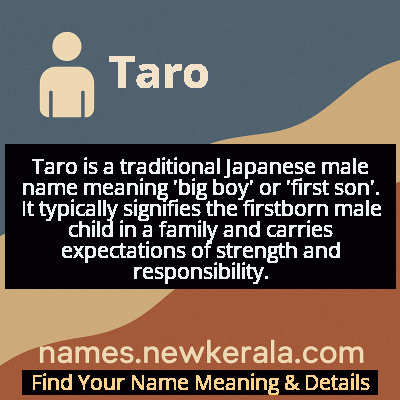Taro Name Meaning & Details
Origin, Popularity, Numerology Analysis & Name Meaning of Taro
Discover the origin, meaning, and cultural significance of the name TARO. Delve into its historical roots and explore the lasting impact it has had on communities and traditions.
Name
Taro
Gender
Male
Origin
Japanese
Lucky Number
9
Meaning of the Name - Taro
Taro is a traditional Japanese male name meaning 'big boy' or 'first son'. It typically signifies the firstborn male child in a family and carries expectations of strength and responsibility.
Taro - Complete Numerology Analysis
Your Numerology Number
Based on Pythagorean Numerology System
Ruling Planet
Mars
Positive Nature
Generous, passionate, energetic, and humanitarian.
Negative Traits
Impulsive, impatient, moody, and can be overly emotional.
Lucky Colours
Red, maroon, scarlet.
Lucky Days
Tuesday.
Lucky Stones
Red coral, garnet.
Harmony Numbers
1, 2, 3, 6.
Best Suited Professions
Military, sports, philanthropy, leadership roles.
What People Like About You
Courage, energy, leadership, generosity.
Famous People Named Taro
Taro Katsura
Politician
Three-time Prime Minister of Japan
Taro Okamoto
Artist
Renowned avant-garde painter and sculptor
Taro Aso
Politician
Former Prime Minister and Deputy Prime Minister of Japan
Taro Gomi
Author
Bestselling children's book author
Name Variations & International Equivalents
Click on blue names to explore their detailed meanings. Gray names with will be available soon.
Cultural & Historical Significance
The name's endurance through centuries speaks to its deep cultural resonance. During the Edo period, Taro was commonly used among samurai families, emphasizing the warrior class's values of strength and leadership. In modern times, while the strict adherence to primogeniture has relaxed, the name continues to symbolize traditional family values and cultural continuity. The name appears frequently in Japanese folklore and literature, most famously in the tale of Momotaro (Peach Boy), where the hero embodies courage, strength, and moral virtue - qualities traditionally associated with the name Taro.
Extended Personality Analysis
Individuals named Taro are typically associated with a personality that reflects the name's traditional meaning of 'big son' or 'first son'. They are often perceived as natural leaders who embody responsibility, reliability, and strength of character. From childhood, many Taros develop a sense of duty and protective instincts, often taking on caretaker roles within their social circles. They tend to be practical, grounded individuals who approach life with seriousness and determination, yet possess a quiet confidence that doesn't need constant validation.
In interpersonal relationships, Taros are known for their loyalty and steadfastness. They may not be the most expressive emotionally, but they demonstrate care through consistent actions and reliability. Their 'big' quality manifests not necessarily in physical size but in their emotional presence and the substantial support they provide to others. While they can be traditional in their outlook, this often translates to strong moral principles and a clear sense of right and wrong. Many Taros excel in positions requiring long-term commitment and responsibility, whether in family life, career, or community roles.
Modern Usage & Popularity
In contemporary Japan, Taro maintains a complex position in naming trends. While it's no longer among the top names for newborns in major urban centers, it retains significant cultural weight and continues to be used by families valuing tradition and heritage. The name has seen a gradual decline in popularity since the mid-20th century as Japanese parents increasingly favor more modern, international, or creatively spelled names. However, Taro remains particularly popular in rural areas and among families with strong connections to traditional Japanese culture. Interestingly, the name has gained some international recognition through Japanese diaspora communities and global interest in Japanese culture, leading to occasional use outside Japan. Current naming data shows that while Taro may not be trendy, it maintains steady usage as a classic, respectable choice that conveys cultural authenticity and family values.
Symbolic & Spiritual Meanings
Symbolically, Taro represents much more than just a firstborn son - it embodies the entire concept of familial continuity and traditional Japanese values. The name serves as a metaphor for strength, stability, and the passing of traditions from one generation to the next. The 'big' element symbolizes not physical size but moral and emotional stature - the idea of someone who carries significant responsibility with grace and capability. In Japanese cultural context, Taro symbolizes the ideal male figure who balances strength with responsibility, leadership with humility. The name also carries connotations of reliability and foundation-building, suggesting someone who provides a stable base for family and community. In broader symbolic terms, Taro represents the enduring nature of cultural identity and the importance of maintaining connections to one's heritage in an increasingly globalized world.

